- Home
- Brandon Sanderson
Legion: The Many Lives of Stephen Leeds Page 4
Legion: The Many Lives of Stephen Leeds Read online
Page 4
Tobias settled back. I flipped the last few pages of the book as Monica sat in thought. Finished, I stuffed the book into the pocket of the seat in front of me.
Someone rustled the curtains, entering from economy class and coming into the first-class cabin. “Hello!” a friendly feminine voice said, coming up the aisle. “I could not help seeing that you had an extra seat up here, and I thought to myself, perhaps they would let me sit in it.”
The newcomer was a round-faced, pleasant young woman in her late twenties. She had tan Indian skin and a deep red dot on her forehead. She wore clothing of intricate make, red and gold, with an Indian shawl-thingy over one shoulder and wrapping around her. I don’t know what they’re called.
“What’s this?” J.C. said. “Hey, Achmed. You’re not going to blow the plane up, are you?”
“My name is Kalyani,” she said. “And I am most certainly not going to blow anything up.”
“Huh,” J.C. said. “That’s disappointing.” He settled back and closed his eyes—or pretended to. He kept one eye cracked toward Kalyani.
“Why do we keep him around?” Ivy asked, stretching, coming out of her nap.
“Your head keeps going back and forth,” Monica said. “I feel like I’m missing entire conversations.”
“You are,” I said. “Monica, meet Kalyani. A new aspect, and the reason we needed that empty seat.”
Kalyani perkily held out her hand toward Monica, a big grin on her face.
“She can’t see you, Kalyani,” I said.
“Oh, right!” Kalyani raised both hands to her face. “I’m so sorry, Mr. Steve. I am very new to this.”
“It’s okay. Monica, Kalyani will be our interpreter in Israel.”
“I am a linguist,” Kalyani said, bowing.
“Interpreter…” Monica said, glancing at the book I’d tucked away. A book of Hebrew syntax, grammar, and vocabulary. “You just learned Hebrew.”
“No,” I said. “I glanced through the pages enough to summon an aspect who speaks it. I’m useless with languages.” I yawned, wondering if there was time left in the flight to pick up Arabic for Kalyani as well.
“Prove it,” Monica said.
I raised an eyebrow toward her.
“I need to see,” Monica said. “Please.”
With a sigh, I turned to Kalyani. “How do you say: ‘I would like to practice speaking Hebrew. Would you speak to me in your language?’”
“Hm … ‘I would like to practice speaking Hebrew’ is somewhat awkward in the language. Perhaps, ‘I would like to improve my Hebrew’?”
“Sure.”
“Ani rotzeh leshapher et ha’ivrit sheli,” Kalyani said.
“Damn,” I said. “That’s a mouthful.”
“Language!” Ivy called.
“It is not so hard, Mr. Steve. Here, try it. Ani rotzeh leshapher et ha’ivrit sheli.”
“Any rote zeele shaper hap … er hav…” I said.
“Oh my,” Kalyani said. “That is … that is very dreadful. Perhaps I will give you one word at a time.”
“Sounds good,” I said, waving over one of the flight attendants, the one who had spoken Hebrew to give the safety information at the start of our flight.
She smiled at us. “Yes?”
“Uh…” I said.
“Ani,” Kalyani said patiently.
“Ani,” I repeated.
“Rotzeh.”
“Rotzeh…”
It took a little getting used to, but I made myself known. The attendant even congratulated me. Fortunately, translating her words into English was much easier—Kalyani gave me a running translation.
“Oh, your accent is horrible, Mr. Steve,” Kalyani said as the flight attendant moved on. “I’m so embarrassed.”
“We’ll work on it,” I said. “Thanks.”
Kalyani smiled at me and gave me a hug, then tried to give one to Monica, who didn’t notice. Finally, the Indian woman took a seat next to Ivy, and the two began chatting amicably, which was a relief. It always makes my life easier when my hallucinations get along.
“You already spoke Hebrew,” Monica accused. “You knew it before we started flying, and you spent the last few hours refreshing yourself.”
“Believe that if you want.”
“But it’s not possible,” she continued. “A man can’t learn an entirely new language in a matter of hours.”
I didn’t bother to correct her and say I hadn’t learned it. If I had, my accent wouldn’t have been so horrible, and Kalyani wouldn’t have needed to guide me word by word.
“We’re on a plane hunting a camera that can take pictures of the past,” I said. “How is it harder to believe that I just learned Hebrew?”
“Okay, fine. We’ll pretend you did that. But if you’re capable of learning that quickly, why don’t you know every language—every subject, everything—by now?”
“There aren’t enough rooms in my house for that,” I said. “The truth is, Monica, I don’t want any of this. I’d gladly be free of it, so that I could live a more simple life. I sometimes think the lot of them will drive me insane.”
“You … aren’t insane, then?”
“Heavens no,” I said. I eyed her. “You don’t accept that.”
“You see people who aren’t there, Mr. Leeds. It’s a difficult fact to get around.”
“And yet, I live a good life,” I said. “Tell me. Why would you consider me insane, but the man who can’t hold a job, who cheats on his wife, who can’t keep his temper in check? You call him sane?”
“Well, perhaps not completely…”
“Plenty of ‘sane’ people can’t manage to keep it all under control. Their mental state—stress, anxiety, frustration—gets in the way of their ability to be happy. Compared to them, I think I’m downright stable. Though I do admit, it would be nice to be left alone. I don’t want to be anyone special.”
“And that’s where all of this came from, isn’t it?” Monica asked. “The hallucinations?”
“Oh, you’re a psychologist now? Did you read a book on it while we were flying? Where’s your new aspect, so I can shake hands with her?”
Monica didn’t rise to the bait. “You create these delusions so that you can foist things off on them. Your brilliance, which you find a burden. Your responsibility—they have to drag you along and make you help people. This lets you pretend, Mr. Leeds. Pretend that you are normal. But that’s the real delusion.”
I found myself wishing the flight would hurry up and be finished.
“I’ve never heard that theory before,” Tobias said softly from behind. “Perhaps she has something, Stephen. We should mention it to Ivy—”
“No!” I snapped, turning on him. “She’s dug in my mind enough already.”
I turned back. Monica had that look in her eyes again, the look a “sane” person gets when they deal with me. It’s the look of a person forced to handle unstable dynamite while wearing oven mitts. That look … it hurts far more than the condition itself does.
“Tell me something,” I said to change the topic. “How’d you let Razon get away with this?”
“It isn’t like we didn’t take precautions,” Monica said dryly. “The camera was locked up tightly, but we couldn’t very well keep it completely out of the hands of the man we were paying to build it.”
“There’s more here,” I said. “No offense intended, Monica, but you’re a sneaky corporate type. Ivy and J.C. figured out ages ago that you’re not an engineer. You’re either a slimy executive tasked with handling undesirable elements, or you’re a slimy security forces leader who does the same.”
“What part of that am I not supposed to take offense at?” she asked coolly.
“How did Razon have access to all of the prototypes?” I continued. “Surely you copied the design without him knowing. Surely you fed versions of the camera to satellite studios, so they could break them apart and reverse engineer them. I find it quite a stretch to believe he somehow foun
d and destroyed all of those.”
She tapped her armrest for a few minutes. “None of them work,” she finally admitted.
“You copied the designs exactly?”
“Yes, but we got nothing from it. We asked Razon, and he said that there were still bugs. He always had an excuse, and Razon did have trouble with his own prototypes, after all. This is an area of science nobody has breached before. We’re the pioneers. Things are bound to have bugs.”
“All true statements,” I said. “None of which you believe.”
“He was doing something to those cameras,” she said. “Something to make them stop functioning when he wasn’t around. He could make any of the prototypes work, given enough time to fiddle. If we swapped in one of our copies during the night, he could make it function. Then we’d swap it back, and it wouldn’t work for us.”
“Could other people use the cameras in his presence?”
She nodded. “They could even use them for a little while when he wasn’t there. Each camera would always stop working after a short time, and we’d have to bring him back in to fix it. You must understand, Mr. Leeds. We only had a few months during which the cameras were working at all. For the majority of his career at Azari, he was considered a complete quack by most.”
“Not by you, I assume.”
She said nothing.
“Without him, without that camera, your career is nothing,” I said. “You funded him. You championed him. And then, when it finally started working…”
“He betrayed me,” she whispered.
The look in her eyes was far from pleasant. It occurred to me that if we did find Mr. Razon, I might want to let J.C. at him first. J.C. would probably want to shoot the guy, but Monica wanted to rip him clean apart.
SIX
“Well,” Ivy said, “it’s a good thing we picked an out-of-the-way city. If we had to find Razon in a large urban center—home to three major world religions, one of the most popular tourist destinations in the world—this would be really tough.”
I smiled as we walked out of the airport. One of Monica’s two security goons went to track down the cars her company had ordered for us.
My smile didn’t do much more than crack the corner of my lips. I hadn’t gotten much study done on Arabic during the second half of the flight. I’d spent the time thinking about Sandra. That was never productive.
Ivy watched me from concerned eyes. She could be motherly sometimes. Kalyani strolled over to listen in on some people speaking in Hebrew nearby.
“Ah, Israel,” J.C. said, stepping up to us. “I’ve always wanted to come over here, just to see if I could slip through security. They have the best in the world, you know.”
He carried a black duffel on his back that I didn’t recognize. “What’s that?”
“M4A1 carbine,” J.C. said. “With attached advanced combat optical gunsight and M203 grenade launcher.”
“But—”
“I have contacts over here,” he said softly. “Once a SEAL, always a SEAL.”
The cars arrived, though the drivers seemed bemused at why four people insisted on two cars. As it was, they’d barely fit us all. I got into the second one, with Monica, Tobias, and Ivy—who sat between Monica and me in the back.
“Do you want to talk about it?” Ivy asked softly as she did up her seat belt.
“I don’t think we’ll find her, even with this,” I said. “Sandra is good at avoiding attention, and the trail is too cold.”
Monica looked at me, a question on her lips, obviously thinking I’d been talking to her. It died as she remembered whom she was accompanying.
“There might be a good reason why she left, you know,” Ivy said. “We don’t have the entire story.”
“A good reason? One that explains why, in ten years, she’s never contacted us?”
“It’s possible,” Ivy said.
I said nothing.
“You’re not going to start losing us, are you?” Ivy asked. “Aspects vanishing? Changing?”
Becoming nightmares. She didn’t need to add that last part.
“That won’t happen again,” I said. “I’m in control now.”
Ivy still missed Justin and Ignacio. Honestly, I did too.
“And … this hunt for Sandra,” Ivy said. “Is it only about your affection for her, or is it about something else?”
“What else could it be about?”
“She was the one who taught you to control your mind.” Ivy looked away. “Don’t tell me you’ve never wondered. Maybe she has more secrets. A … cure, perhaps.”
“Don’t be stupid,” I said. “I like things how they are.”
Ivy didn’t reply, though I could see Tobias looking at me in the car’s rearview mirror. Studying me. Judging my sincerity.
In fact, I was judging my own.
What followed was a long drive to the city—the airport is quite a ways away, closer to Tel Aviv. The route was scenic between cities, and once we entered the modern part of Jerusalem, we passed several parks along one side of the road. As we approached our destination Tobias pointed out the Tower of David, its stones bearing the weight of unimaginable time. Passing through Jaffa Gate was followed by a hectic ride through the streets of the Old City. It was uneventful, save for us almost running over about seventeen tourists. When the cars stopped we piled out, entering a sea of chattering sightseers and pious pilgrims.
There was no parking at the church itself, so we had to walk through alleys and streets for a good five minutes before arriving. But finally it stood before us. Built like a box, it had an ancient, simple façade with two large arched windows on the wall above us. “The Church of the Holy Sepulchre,” Tobias said. “Held by tradition to be the site of the crucifixion of Jesus of Nazareth, the structure also encloses one of the traditional locations of his burial. This marvelous structure was originally two buildings, constructed in the fourth century by order of Constantine the Great. It replaced a temple to Aphrodite that had occupied the same site for approximately two hundred years.”
“Thank you, Wikipedia,” J.C. grumbled, shouldering his assault rifle. He’d changed into combat fatigues.
“Whether tradition is correct,” Tobias continued calmly, hands clasped behind his back, “and whether this is the actual location of the historical events, is a subject of some dispute. Though tradition has many convenient explanations for anomalies—such as reasoning that the temple to Aphrodite was constructed here to suppress early Christian worship—it has been shown that this church follows the shape of the pagan one in key areas. In addition, the fact that the church lies within the city walls makes for an excellent disputation, as the tomb of Jesus would have been outside the city.”
“It doesn’t matter to us whether it is authentic or not,” I said, passing Tobias. “Razon would have come here. It’s one of the most obvious places—if not the most obvious place—to start looking. Monica, a word, please.”
She fell into step beside me, her goons going to check if we needed tickets to enter. The police presence here seemed very heavy—but then, the church is in the West Bank, and there had been a couple of terrorist scares lately.
“What is it you want?” Monica asked me.
“Does the camera spit out pictures immediately?” I asked. “Does it give digital results?”
“No. It takes pictures on film only. Medium format, no digital back. Razon insisted it be that way.”
“Now a harder one. You do realize the problems with a camera that takes pictures of one’s exact location, only farther back in time, don’t you?”
“What do you mean?”
“Merely this: We’re not in the same location now as we were two thousand years ago. The planet moves. One of the theoretical problems with time travel is that if you were to go back in time a hundred years to the exact point we’re standing now, you’d likely find yourself in outer space. Even if you were extremely lucky—and the planet were in the exact same place in its orbit—the Earth�
�s rotation would mean that you’d appear somewhere else on its surface. Or under its surface, or hundreds of feet in the air.”
“That’s ridiculous.”
“It’s science,” I said, looking up at the face of the church. What we’re doing here is ridiculous.
And yet …
“All I know,” she said, “is that Razon had to go to a place to take pictures of it.”
“All right,” I said. “One more. What’s he like? Personality?”
“Abrasive,” she said immediately. “Argumentative. And he is very protective of his equipment. I’m sure half of the reason he got away with the camera was because he’d repeatedly convinced us he was OCD with his stuff, so we gave him too much leniency.”
Eventually, our group made its way into the church. The stuffy air carried the sounds of whispering tourists and feet shuffling on the stones. It was still a functioning place of worship.
“We’re missing something, Steve,” Ivy said, falling into step beside me. “We’re ignoring an important part of the puzzle.”
“Any guesses?” I asked, looking over the highly ornamented insides of the church.
“I’m working on it.”
“Wait,” J.C. said, sauntering up. “Ivy, you think we’re missing something, but you don’t know what it is, and have no clue what it might be?”
“Basically,” Ivy said.
“Hey, Skinny,” he said to me, “I think I’m missing a million dollars, but I don’t know why, or have any clue as to how I might have earned it. But I’m really sure I’m missing it. So if you could do something about that…”
“You are such a buffoon,” Ivy said.
“That there, that thing I said,” J.C. continued, “that was a metaphor.”
“No,” she said, “it was a logical proof.”
“Huh?”
“One intended to demonstrate that you’re an idiot. Oh! Guess what? The proof was a success! Quod erat demonstrandum. We can accurately say, without equivocation, that you are indeed an idiot.”
The two of them walked off, continuing the argument. I shook my head, moving deeper into the church. The place where the crucifixion had supposedly taken place was marked by a gilded alcove, congested with both tourists and the devout. I folded my arms, displeased. Many of the tourists were taking photographs.

 Steelheart
Steelheart The Rithmatist
The Rithmatist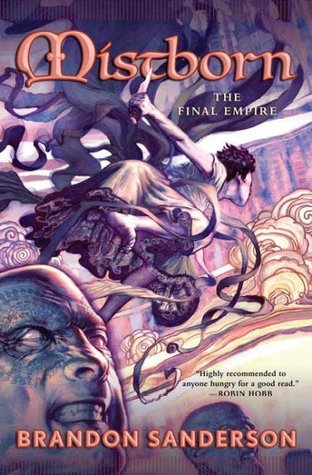 Mistborn: The Final Empire
Mistborn: The Final Empire Oathbringer
Oathbringer The Way of Kings
The Way of Kings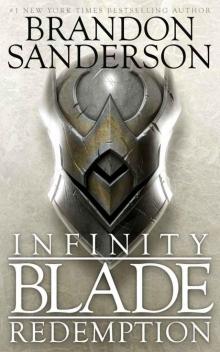 Redemption
Redemption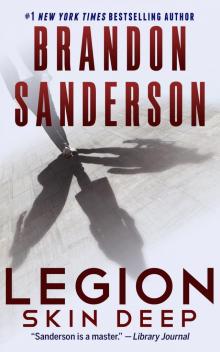 Skin Deep
Skin Deep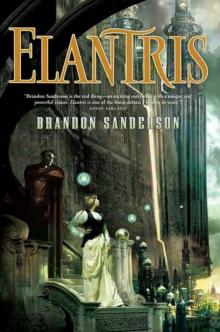 Elantris
Elantris Snapshot
Snapshot Sixth of the Dusk (Cosmere)
Sixth of the Dusk (Cosmere) Mistborn: Secret History
Mistborn: Secret History White Sand, Volume 1
White Sand, Volume 1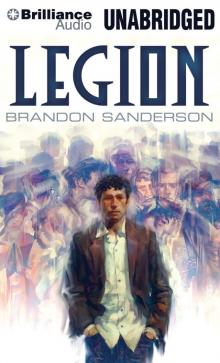 Legion
Legion The Well of Ascension
The Well of Ascension The Bands of Mourning
The Bands of Mourning Words of Radiance
Words of Radiance The Hero of Ages
The Hero of Ages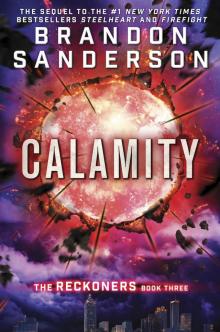 Calamity
Calamity Alcatraz Versus the Scrivener's Bones
Alcatraz Versus the Scrivener's Bones The Alloy of Law
The Alloy of Law The Emperors Soul
The Emperors Soul The Dark Talent
The Dark Talent The Gathering Storm
The Gathering Storm Alcatraz Versus the Shattered Lens
Alcatraz Versus the Shattered Lens Mitosis
Mitosis Alcatraz vs. The Evil Librarians
Alcatraz vs. The Evil Librarians Rhythm of War (9781429952040)
Rhythm of War (9781429952040) Alcatraz Versus the Knights of Crystallia
Alcatraz Versus the Knights of Crystallia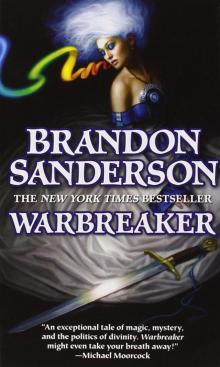 Warbreaker
Warbreaker Firstborn
Firstborn Starsight
Starsight Edgedancer
Edgedancer Perfect State
Perfect State Shadows of Self
Shadows of Self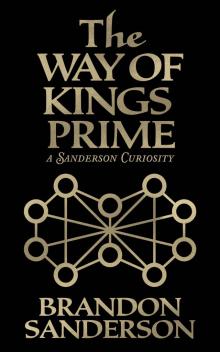 The Way of Kings Prime
The Way of Kings Prime Starsight (US)
Starsight (US) Shadows for Silence in the Forests of Hell
Shadows for Silence in the Forests of Hell Arcanum Unbounded: The Cosmere Collection
Arcanum Unbounded: The Cosmere Collection Awakening
Awakening Firefight
Firefight Dawnshard
Dawnshard Defending Elysium
Defending Elysium White Sand
White Sand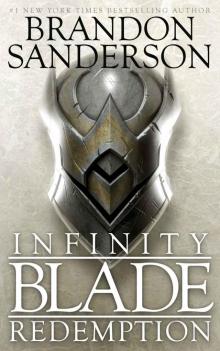 Infinity Blade: Redemption
Infinity Blade: Redemption The Final Empire
The Final Empire Skyward
Skyward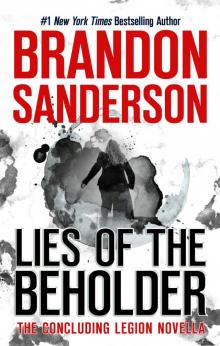 Lies of the Beholder
Lies of the Beholder Elantris e-1
Elantris e-1 Steelheart r-1
Steelheart r-1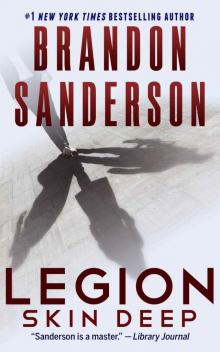 Legion: Skin Deep
Legion: Skin Deep Well of Ascension
Well of Ascension Mistborn
Mistborn Alcatraz versus the Evil Librarians
Alcatraz versus the Evil Librarians The Final Empire m-1
The Final Empire m-1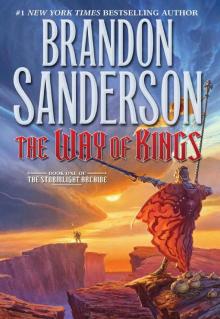 The Way of Kings (Stormlight Archive, The)
The Way of Kings (Stormlight Archive, The)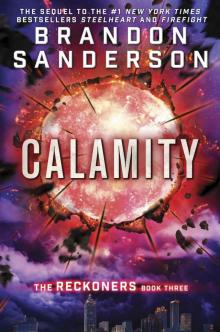 Calamity (The Reckoners)
Calamity (The Reckoners) Legion and the Emperor's Soul
Legion and the Emperor's Soul Legion: The Many Lives of Stephen Leeds
Legion: The Many Lives of Stephen Leeds The Mistborn Trilogy
The Mistborn Trilogy Bands of Mourning
Bands of Mourning Alcatraz
Alcatraz The Hero of Ages m-3
The Hero of Ages m-3 Alcatraz vs. the Shattered Lens
Alcatraz vs. the Shattered Lens The Alloy of Law: A Mistborn Novel
The Alloy of Law: A Mistborn Novel The Way of Kings sa-1
The Way of Kings sa-1 Infinity Blade: Awakening
Infinity Blade: Awakening Sixth of the Dusk
Sixth of the Dusk The Stormlight Archive
The Stormlight Archive The Aether of Night
The Aether of Night